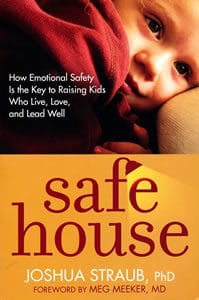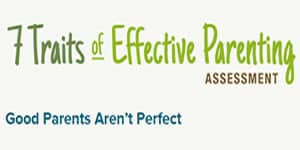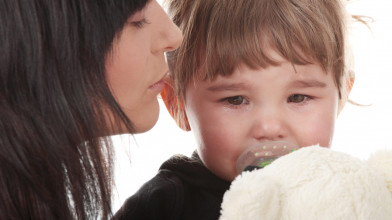Opening:
Teaser:
Dr. Joshua Straub: In order to be understood as a parent, we must first understand. And emotional safety, at the core of emotional safety is seeking the underlying motivation of what’s really going on in our kids’ hearts and minds. And that goes into infancy, stopping and taking a step back and just going, let me understand. Let me become a student of my infant. Let me become a student of my 5-year-old. Let me become a student of my 15-year-old. What’s really going on underneath their behavior?
End of Teaser
John Fuller: That’s Dr. Joshua Straub describing what your child needs most to thrive in the home. And Josh and his wife, Christi are here with more to share on that on today’s “Focus on the Family.” Your host is Focus president and author, Jim Daly and I’m John Fuller.
Jim Daly: John, most of us as parents, we understand physical safety. How soon after the kids were born, did you lock everything down?
John: Well (Laughter), I think was one of them.
Jim: I was out at Home Depot, gettin’ the lock, the plug for the electrical.
John: We took it a little more seriously when at 8 months our second son was on top of the washing machine, getting into the laundry cabinet. We thought (Laughter) we’d better lock things down a little bit more than we had.
Jim: The point is, we understand that. We’re drilled as new parents to do all we can to protect our children from physical harm. But you know, the fact of the matter is, there’s another side of this and that’s emotional safety in your home. That’s something you can’t go to Home Depot for. There’s no kit that you can buy that says, “This is how to protect your child emotionally” as you’re parenting that child.
Man, I look back on (Laughing) our experience. I apologize so often to Trent and Troy (Chuckling). “I’m sorry the way I yelled at you when I couldn’t shampoo your hair.” I didn’t realize Trent had a tactile issue. And you know, he would freak [out]when I’d go to shampoo his hair. I didn’t get that until about 2 ½-years-old and we would always have a struggle and a fight. That’s emotional safety. And thankfully, we picked up on it. Took us a little time, but that’s what we’re talking about and we’re gonna do that with two special guests today.
John: As I said, Dr. Joshua Straub and his wife, Christi are here. Josh is an author, a speaker, a family advocate and a professor of child psychology and his wife, Christi has a background in marriage and family counseling and together they speak and write and do a lot of social media about marriage and family issues.
Body:
Jim: Josh and Christi, welcome to “Focus on the Family.”
Christi Straub: Thanks for havin’ us.
Jim: First time.
Christi: Yeah.
Joshua: Thank you for having us.
Jim: And Christi, you were a[n] alum of our Focus on the Family Institute.
Christi: I am. I’m one of you.
Jim: And so, man, that’s awesome. I’m grateful.
Christi: It is so good to be back.
Jim: (Laughing) Yeah.
Christi: Yeah.
Jim: And Canadian by birth, right?
Christi: I am, yes.
Jim: So, all our Canadian listeners, there you go. From Toronto?
Christi: I am proud. I am a dual citizen now.
Jim: Okay.
Christi: So, I can say I’m like dually proud, I guess.
Jim: Dually proud.
Christi: Yeah.
John: Doubly proud.
Jim: There you go, doubly proud.
Christi: Yeah.
Jim: Okay, let’s get on it. I like that comparison. Jean and I, you know, when it comes to physical safety, that’s the discussion of the day for us. Did the kids have the bike helmet on? And I may have forgotten that. What! How could you forget that?
Jim: But emotional safety is so much more important in many ways, right? Not to, you know, diminish physical safety. That’s important, too. But we don’t often think about emotional safety. We just go about parenting as we were parented, probably what we were taught, how we were taught. What is emotional safety?
Joshua: Yeah, I describe it as the posture from which we parent, not necessarily the techniques, because in today’s day and age of parenting, there are so many different techniques. And you guys mentioned about Home Depot, right? (Laughter) There [are] so many products that the parenting world puts out there on a shelf to give your baby, you know, or your child the advantage, whether it’s academic advantage, whether it’s the spiritual advantage, whether it’s the athletic advantage.
Christi: Yes.
Joshua: And we have travel teams and all these kinds of things. [There’s] nothing wrong with all of that, but at the end of the day for us, we became so overwhelmed early on as parents by all of the marketing ploys that were out there. And you need this and you have to have that. And then you have social media and Pinterest and all this, all these other [things].
Jim: Perfectionistic.
Joshua: The perfectionistic and you’re comparing yourself with other parents and you’re going, “What really am I looking to do here?” And we scaled back. We had a conversation and scaled back and said, okay, we’re counselors. We’ve been working with juvenile delinquents and troubled families.
And our education is in this, but yet, when you go to do it, it’s like all the education (Laughing) goes out the window! And so, we were like, keeping the end in mind, what really matters most? And obviously, at the end of the day, we want to raise kids who love God and love others.
And as I went back over the research, I was looking, keeping the end in mind, what was it that we really desired most in raising our kids? And this word “safety, emotionally safe” kept popping out over and over again. And we said, “Wow! There’s something to this.” And from that point on, we said, not that parenting’s gonna be easier, but what if it were simpler? What if this was simpler than we think?
Jim: I think every parent would say, that would be great (Laughter) cause we do tend to complicate it.
Joshua: Yeah.
Jim: In your book, Safe House, you talked about an interesting statistic. You said 80 percent of kids are told achievement and happiness are more important than helping others. That is interesting and that’s so true in our culture particularly of individualism and how do we do better? And my kid’s on the honor roll. We all see the bumper stickers. Do you have one of those bumper stickers, John? (Laughter)
John: If my child qualified, I’d put one on. (Laughter)
Jim: You and I are in the same boat, man. (Laughter) I’m gonna talk to Trent and Troy tonight about that. Hey, where’s my bumper sticker? Yeah, we’ll get it later, dad. But the point of that is, we raise up achievement and success to such a level in this culture and we don’t necessarily lift up those values and those virtues that are so biblically based. How do we begin to do that?
Christi: Well, and I think just like you’re saying, I mean, we want a bumper sticker, right? That’s our only measure outwardly of value as a parent. Are we doing a good job? Well, I got a bumper sticker. (Laughter) Like my kid’s doing really well in school. Or he’s on the travel team, you know. Or he made this or they’re building such and such for their club project.
But what’s invisible somewhat is, is our child sharing with another child in the corner or letting another child go in front of them? Or it’s those invisible values of character traits that we want so badly to instill in them, but there’s no measure for that.
Joshua: And I think one way to move away from that outward success to focusing on that inward character is getting rid of the power of “they.”
We were talkin’, I’m (Laughter) a huge research guy. And I love the groundwork we’re doing in research and Scripture, but a lot of times they say that, you know, good grades are what we need to do and our kids have to go to college. And we have to do this, this and this, but at the end of the day and “they” is also our friends on all those social media sites.
Christi: Yeah.
Joshua: Well, my friends have their kid in this activity. Maybe we should put our kids in that activity, too. When the reality is, if we took a step back and we said, what about raising our kids in the way they should go? You know, our kids have different passions and personality styles and temperaments. You know, you talked about your son having tactile, you know, even at 2 ½.
Like it’s not just those sensitivities, but you know, what are the sensitivities that our kids have? And how can we find their passions and their purpose and their personality and grounded in the Word of God, help them find what it is they’re passionate about, rather than throwing them into so many different activities and putting so much extra pressure on them of our own, you know, from our own parenting fears?
Jim: Oh, yeah. Right, so let me put the pressure.
Joshua: We’ll get into that, yeah.
Jim: I’m gonna put the pressure on you with your kids now and that Pinterest parenting approach. Christi, did you have a downer time because of the perfect moment? You didn’t arrive to deliver the perfect moment for your family and your kids?
Christi: Oh, I feel like parenting for me to step back, like you know, you walk into this world and it’s so unknown, right? No one tells you really what it’s gonna be like or what to expect. And it was like, I have never felt so inept (Laughter), incapable, unaware–
Joshua: Sinful.
Christi: –sinful, oh my goodness–
Jim: It’s so true.
Christi: –sinful.
John: Nice of you to add that. (Laughter)
Christi: And I mean, you can look back and I’m sure, you know, generations past, there [are] so many things that this is not new.
Jim: Right.
Christi: But what is new, Pinterest. What is new, Amazon Prime. You know, (Laughter) I am not a Pinterest mom. I’m an Amazon Prime mom. (Laughter)
Jim: So is Jean.
Christi: Like I just search it and then it gets sent to my house. I do not DIY it. But it’s too easy to compare. Like it’s surrounding us. And so, I feel like from the moment those babies come out into this world, it’s like I’m already behind. They’re already doing it better. Model mom on, you know, Instagram who’s probably a photographer. It’s really lovely to look at her family, but I can’t measure up to that. I don’t get out of sweats all day (Laughter), you know?
Jim: Well, no and so many moms particularly are gonna relate to that Christi and I love that vulnerability and that’s what you battle with every day and both of us as moms and dads. I mean, we struggle with those things. But now Thomas Jefferson, Josh, said that one of the great constitutional rights that we possess is the pursuit of happiness.
Christi and Joshua: Uh-hm, yes. (Laughter)
Jim: This is a constitutional right, but in your book, Safe House, you’re saying, happiness may not be the end game. This probably isn’t what your children need the most, but we as parents, are striving to keep our kids happy. What’s wrong?
Joshua: And we want happy kids. Don’t get me wrong. It’s not that I don’t want my kids to be happy, but at the end of the day and I think this goes deeper and I think we have to take a look at this in terms of deeper we know that joy is a much deeper; it’s a state of being and it goes deeper than happiness. Happiness is a feeling, but joy is a state of being. And to be truly happy, to raise kids who are joyful kids, comes out of serving others. It comes out of loving God and loving others.
And I think the one way for us to be able to practice that in our daily lives, it’s not that kids being in sports and activities is bad or wrong or them getting good grades is wrong, but I think it needs to be balanced. Emotional safety is for all of us to pull back into our homes and really set a mission as a family and say, what is that end goal that we’re looking for in our kids and how can we accomplish that?
And therefore, how do we serve others as a family? What does that look like? How are we showing our kids that raking the widow’s lawn next door is more important than getting an A in chemistry? Or, you know, and again, it’s not that it’s not important, that A‘s not important; it’s that we are prioritizing that inward character. We’re prioritizing loving God and loving others and we’re showing our kids how to do that, as well.
Jim: With Safe House, first give us that definition of what a safe house looks like. I think you’re touching on it there, but I want it more direct.
Joshua: Yeah.
Jim: And then how do I start? What do I do? I mean, I have two teens. You’ve got six kids different ages, John, a couple out of the home now. Speak to us as dads and moms, as to how we get started creating a safe house.
Joshua: Yeah, so I talk about the [fact that it’s the] posture from which we parent, not the techniques that matters most, so, that posture of emotional safety. And the way that I define that in its most pure form is that a safe relationship equals love minus fear.
And I love this because obviously, the Bible, 1 John 4:18 says what? , “Perfect love casts out fear.” But what’s fascinating is the secular research also says the exact same thing, that in attachment we must feel the safety within ourselves and create the sense of and in quotes, “love without fear” within our children. That’s what the secular research shows, creating love without fear in our children.
And a lot of what we’re talking about already are parenting fears. It’s our fears that are putting pressure on our kids or it’s our fears that are driving this sense of outward success versus inward character.
And so, if we can begin to piece together our own story as parents, because it really comes back to who we are and how we [were raised].
Jim: And what does that mean, to piece our story together?
Joshua: Yeah, that’s a great question, because a lot of times as you mentioned earlier, a lot of times we parent the way either our parents parented us.
Jim: Right.
Joshua: Or we go the exact opposite because we hate the way our parents parented us.
Jim: Right.
Joshua: And so, we just go by default. Putting our own story is going back into our own childhood and looking at how our parents parented us or looking at some ways that we just automatically react to our kids rather than respond to them. And it’s similar to your story.
Jim: Learned behavior.
Joshua: It’s learned behavior, you know?
Jim: Right.
Joshua: You know, we think that our kids are being disobedient, when the reality is what’s going on underneath them is a tactile sensitivity, right?
Jim: Right.
Joshua: And we translate that into disobedience. So, automatically we’re disciplining or punishing or yelling, you know, reacting to our kids out of that, as opposed to really getting underneath. What’s happening with our child? What’s the underlying motivation? What’s the underlying emotion? Because a lot of times, it’s very different than the way we perceive it.
Jim: You talk about raising your kids and doing something early in their development, where you’re doing faces with them. That’s something I think a lot of us as parents do. I did that probably incessantly with our boys. (Laughter) In other words, Jean was like, “Enough with the happy face, the sad face, the aggravated face, the surprise face.” I mean, we did ’em all. But you say that is a very good way to begin teaching your kids about emotions.
Joshua: Yes.
Jim: And another stat wrapped up in that, you said that by the age of 1, most kids have a sense of their uh … well-being or their trust level within relationship. Explore that with me, because that sounded a little crazy.
Joshua: Deterministic, yeah.
Jim: Yeah, by age 1, they can already begin to set those patterns in their own development?
Joshua: Yeah and this is based out of attachment theory or attachment research, John Bowlby, Mary Ainsworth, Mary Main. They … (Laughter)
Jim: They?
Joshua: They, yeah, but these “they’s” have names. Research shows that by the age of 1, [there are patterns], ’cause everybody looks normal when things are going well. It’s not until we hit stress or duress. But to go back to emotional safety here for a minute, we’re talkin’ about those stressful moments. We’re talking about those moments when our kids are acting out and they’re hurting or they’re broken or they’re being picked on at school or they’re overwhelmed and it’s those moments, our ability to be present as parents.
Jim: Give us that example with your own kids.
Christi: Yeah.
Jim: I know they’re fairly young yet, but you’ve had to connect these dots? What were they doing that you needed to kinda sort them out with a particular face? (Laughing)
Christi: You know what? This happened just coming here on this trip. We often don’t travel together ’cause our kids are pretty young. So, our daughter, she is 2 and the night we were leaving to come here, you know, we prayed with her. We did our whole bedtime routine. And then I said, “Honey, it’ll be about three more sleeps,” ’cause that’s how we count the days in our family.
Jim: Right, I remember that.
Christi: Yeah, three more sleeps and mommy and daddy’ll be back home, okay? And you know, their grandma’s there taking great care of them. They’re having way more fun probably (Laughter) than they normally do–
Jim: That’s right. You don’t even want to know what Grandma’s giving them (Laughing).
Christi: –and way more sugar. Yeah, they’ll be in detox when we go back. But anyway, and she looked at me and it was just panic, like utter panic that we were leaving.
Well, I knew in that moment that if she saw fear in my face or worry that I was concerned about her or us leaving her, that she would interpret, there is something to fear here. So, I tried as best as I possibly could to (Laughing) communicate, “Baby, you are safe. You know, your grandma is here. You are gonna have so much fun. This is good for mommy and daddy to get away. It’s good for you and your brother. But I knew in that moment the importance of how she is absorbing whether or not she was safe.
Jim: Hm.
Christi: And I wrote about this one time, but it immediately bought me back to the Lord and in Numbers 6, in 24 to 26, when it talks about when God gives Moses this blessing, this prayer to the Israelites. And He says, you know, “May God bless you and keep you and make His face shine upon you and be gracious to you and give you peace.”
And I realized how true is that for our own lives? That just as our kids look to our faces to judge in a situation whether they are safe or not, we also look to our Father if we turn and look at His face.
Jim: Yeah. Let me ask you this. You say in Safe House, there [are] two fundamental questions that children need answered as early as you can answer them as a parent. What are those two questions?
Joshua: Yeah, from the very moment our children are born, they’re asking questions and they’re unconscious questions, but those questions are, “Am I safe?” and “Am I loved?” Am I worthy of love? And are others capable of loving me? So at the end of the day, you know, you look at this. All of those questions are summed up into that one primary question, “Am I safe?”
Jim: But you know what we struggle and sorry to interrupt. I want you to continue, but what we struggle with, I think as adults, that we don’t even understand that they can understand that.
Christi: Right.
Jim: But they do and I’d like for you to explain how a child who doesn’t have even a vocabulary yet, understands how to feel safe and to feel loved, that they’re actually asking that in some way and needing it? Help an adult mind understand how that child’s mind is working.
Joshua: Yeah, Christi mentioned about our daughter, Kennedy having this experience that we’re leaving for three sleeps.
Jim: Right.
Joshua: Early on in the first year of life, you can’t communicate that to an infant, ’cause they’re not getting it. But let’s take a single mom for instance of let’s say three kids. And one of those is an infant and she has to work and she has to take care of those three kids. And that child, that infant is crying. That infant is hungry. They’re tired. We know in our home when our kids are acting out, one of the very first two questions we ask, ’cause we have a disease in our house called “hangry.”
Jim: (Laughing) Hangry! I’m hungry and I’m angry, so solve the problem.
Joshua: You know and so, if our kids are acting out, rather than seeing it as disobedience, we filter it as either to [being] hungry or tired, first of all.
Jim: Is that only for kids, by the way? Can adults be that, too?
Christi: Kind of yes. They get it from their mother. (Laughter)
Jim: I want to be in that club.
John: Hangry. (Laughter)
Jim: I’m “hangry.”
Christi: They come by it very honestly.
Joshua: But early on they have needs and again, I’m gonna go back to that whole idea that it’s in moments of stress. It’s that fight of flight response.
Jim: Yeah.
Joshua: When we’re scared, [we’re thinking], is the world that we’re living in safe or dangerous? Can I rely on my parents when I need them most? Or can I rely on my primary caregiver when I need them most? And this is being asked in that first year of life.
Jim: Let me change that now to the parents’ perspective and I was guilty of this. I would react out of frustration. I wasn’t as thoughtful to say, okay, there must be an underlying reason that this child that has no other reason to annoy me is doing what he’s doing. I mean, he’s crying. He’s fussy.
Christi: Right.
Jim: [I’d say], “Come on; straighten up. Let’s go.”
Joshua: Yeah.
Christi: Or just sleep. Please just sleep.
Jim: And how do I as a parent who may default to that behavior, use a trigger? What kind of trigger can I use to say, okay, slow down; back up; your little one is not trying to annoy you on purpose.
Joshua: Yeah.
Jim: And a lot of young parents particularly, man, they struggle with this, ’cause they’re not managing it well, that emotion.
Joshua: Yeah.
Jim: It triggers something in them that they’re not thinking, “Oh, that little one has a problem. Let me try to help that child’s problem,” which is the right thing.
Joshua: Absolutely. Well, and part of that’s because I mean, just lookin’ at Christi here. I mean, you see the stress. Whether you’re a working mom or a stay-at-home mom or you’re a working dad, two working parents, I mean, we live in a busy culture. So, we’re already overwhelmed and we’re thinking about ourselves.
I use a phrase that I think is important for all of us to kinda think about. I use this with my wife. I use it (Chuckling) with my kids in particular, but it’s the Golden Rule and taking out the word “do” or “treat” with the word “understand.”
In order to be understood as a parent, we must first understand. Let me rephrase that. In order to be understood, we must first understand. And emotional safety, at the core of emotional safety is seeking the underlying motivation of what’s really going on in our kids’ hearts and minds. And that goes into infancy, stopping and it’s mindfulness. It’s taking a step back and just going, let me understand. Let me become a student of my infant. Let me become a student of my 5-year-old. Let me become a student of my 15-year-old. What’s really going on underneath their behavior?
Because as you’re mentioning, when we as adults start to act out, there’s something else going on and we just want somebody to understand. We want somebody to understand us, rather than just assuming that it’s disobedience, rather just assuming that they’re acting out, there’s something deeper going on. So, taking a step back and going, in this moment right now, how can I be the emotionally safest for my child?
Jim: Yeah.
Joshua: And a lot of times you just need a hug.
Jim: Well, and here’s one of the problems we have and I heard this the other day. Actually somebody said with all the technology that [is] in households today, in parents’ hands, in kids’ hands, we live in a perpetual state of distraction, that we can’t fully concentrate and stop and say, why is my child doing what he or she is doing? ‘Cause we in between texts and you know, other things. To really know your child well enough, it takes more than a half-hearted effort, right?
Joshua: Yeah, absolutely. I mean, we gotta be present and to give an example of this is, I was working with a dad of a 14-year-old. And so, if you have a teenager, this applies. We’re talking a lot about young kids, but to go to the teenage years for a second. I was working with a dad of a teenager. His 14-year-old daughter had come home and she wanted to go to a Friday night football game and her dad said no. And she looked at him and she said, “Dad, I hate you” and she stormed to her room and slammed the door shut.
And in that moment, when I talk about the posture of emotional safety here, emotions matter. And what happened in this instance, the posture of emotional safety is not that dad punishing the negative emotion, you know, looking at her and going, “Don’t you ever speak to me that way. You go to your room; I’m taking your phone for a month and no, you’re not going to that Friday night football game.”
Jim: Right, you ratchet it up.
Joshua: You’re ratcheting it up. It’s also not dismissing that negative emotion. It’s not goin’, you know, it’s just a Friday night football game; who cares, you know? It’s also not minimizing it. You know, don’t be mad at me. Uh …
Jim: Okay, now you described 98 percent of parenting tactics. What’s the 2 percent (Laughter) that are doin’ it right?
Joshua: And so, the posture of emotional safety is the ability to be able to and when I speak, I get down on one knee. I lean forward and I put my arms out. It’s that understanding to be understood and saying, “Honey, what is it about that Friday night football game that matters to you so much?”
And what that dad found out was, she had been rejected by a group of her friends that she normally hung out with. And this was the first time that school year [she got invited]. She would see them on Pinterest and Facebook, hanging out without her, SnapChat. And this was the first time, this Friday night football game, that they invited her to be a part of something.
Jim: Oh, wow.
Joshua: And her dad said no and the anger, the frustration and I’m not saying that we don’t discipline the disrespect towards dad, but when we lead in grace, you know, in 1 Peter he writes about being a steward of God’s good grace. When we lead in grace and follow up in truth, that’s what we’re talkin’ about. Not leading in truth, because we know that truth without grace is received as condemnation and we’re just gonna push our kids further away from us when we act that way.
And so, that’s the power of emotional safety. That’s the posture of emotional safety we’re talkin’ about, whether we’re with our infants or with our teenagers.
Jim: Yeah. And that is so good and you know, for all of us as parents and I’m thinkin’ of, you know, all of the moments I have blown it and hopefully, I’ve had the presence of mind to apologize. I’ve tried to when I’ve reacted wrongly and to say to my boys, you know, “I’m sorry; I didn’t handle that well.” That’s critical, as well. But John, I don’t know about you, but are you goin’ through your Rolodex here of the bumps along the way?
John: Oh, well, yeah (Laughter), because it’s so easy to naturally think the child at that moment, to go back to that teen girl moment, she is just being irresponsible and disrespectful and I need her to toe the line–
Jim: (Laughing) Go on, dad. Come on.
Christi: Exactly.
John: — instead of doing as you said, Josh, which is to say, “What are you feeling?” And of course, she can’t express that to him. She can’t say, “Oh, dad, well, let me just tell you all the reasons why I should be able to go.” She’s not gonna go there.
Joshua: Yeah.
John: So, understanding the child and the emotions underneath, that’s a crucial thing that’s really hard to do.
Jim: Well, and this has been great, but I’ve got more questions for next time, so you’re gonna have to stick with us. We’re gonna go over some more. We want your house to be a safe house.
And I think this is an excellent resource, John, for folks who maybe haven’t even thought of a safe house concept in this way—emotionally safe. And we want to make this available to you. And for a gift of any amount to help us here at Focus on the Family, we’ll send you a copy of Josh’s book, Safe House, so you can begin to kinda delve into these topics a little more deeply and better understand what Josh is driving at.
John: Well, you can learn more about the book and a CD or a download of our conversation today when you call 800-232-6459; 800, the letter A and the word FAMILY or stop by www.focusonthefamily.com/radio for more.
At the website, we’ve got a new tool for moms and dads. It’s a parenting assessment, which can help you evaluate your unique strengths and maybe some areas where you might need some improvement. We’ll recommend you check it out today.
Jim: Josh and Christi, before we let you go, tonight sitting around the dinner table, I’m connecting with what you’re saying. I haven’t done it. I’ve stumbled. I get angry. I get upset. What can I do tonight to kinda change the tide? What can I say to my kids tonight that will make a difference for them to feel safe?
Joshua: I think what I want to do is focus in on this one particular stat, that research shows that if we get the emotional safety thing right just two out of five times.
Christi: Isn’t that great?
Jim: Two out of five.
Christi: Two out of five.
Jim: Leaves a lot of room for improvement. (Laughter)
Joshua: [If we hit it] 40 percent of the time, that you’re still gonna get the outcomes you’re looking for in your kids. So, we can take a deep breath, parents, because we will mess up, but the key is exactly what you’re talking about, that we seek to apologize to our kids when we’ve wronged them, to be specific about the offense, because what it does is it shows our kids that we’re not perfect and what we do is, we help them understand we don’t expect them to be perfect and we help them learn how to deal with it when they’re not.
Jim: And you’re not gonna want to miss that. Come back next time. Listen with us as we talk with Josh and Christi.
Closing:
John: More great conversation with the Straubs next time on “Focus on the Family,” including why perfection isn’t your goal in parenting.
Excerpt:
Christi Straub: And can I just say though, too, just like we are average parents at best, truly. I don’t think I excel at much as a parent except for asking for forgiveness. I’ve gotten really good at that.
End of Excerpt
John: I’m John Fuller and on behalf of Focus president, Jim Daly and the entire team, thanks for listening. Join us again next time, as we once again, help you and your family thrive in Christ.





















